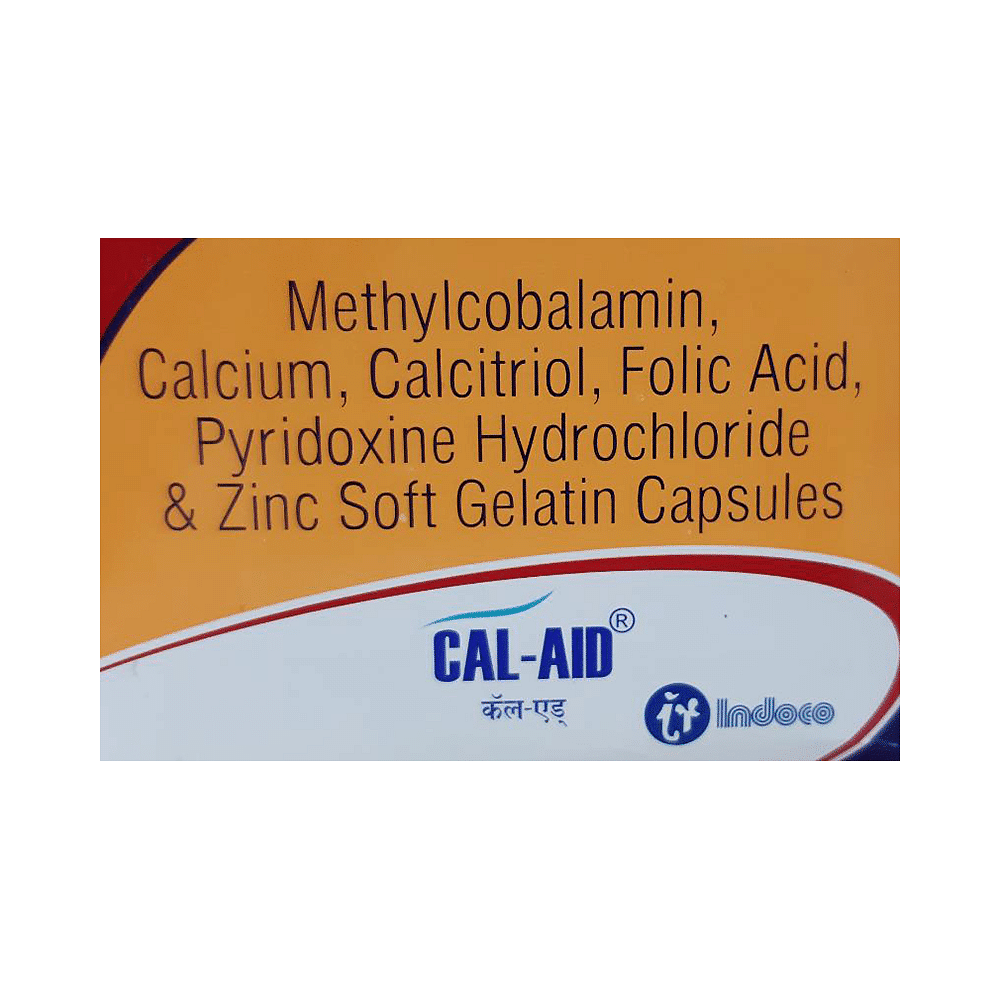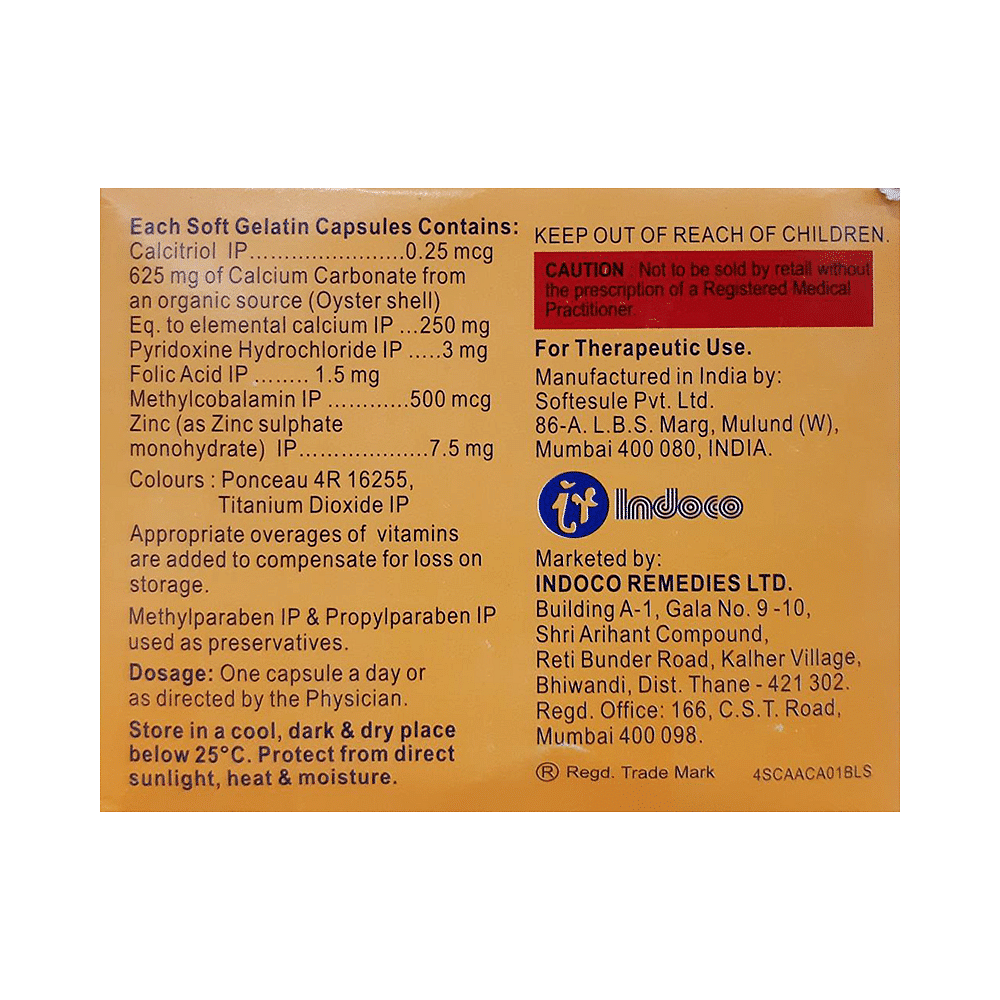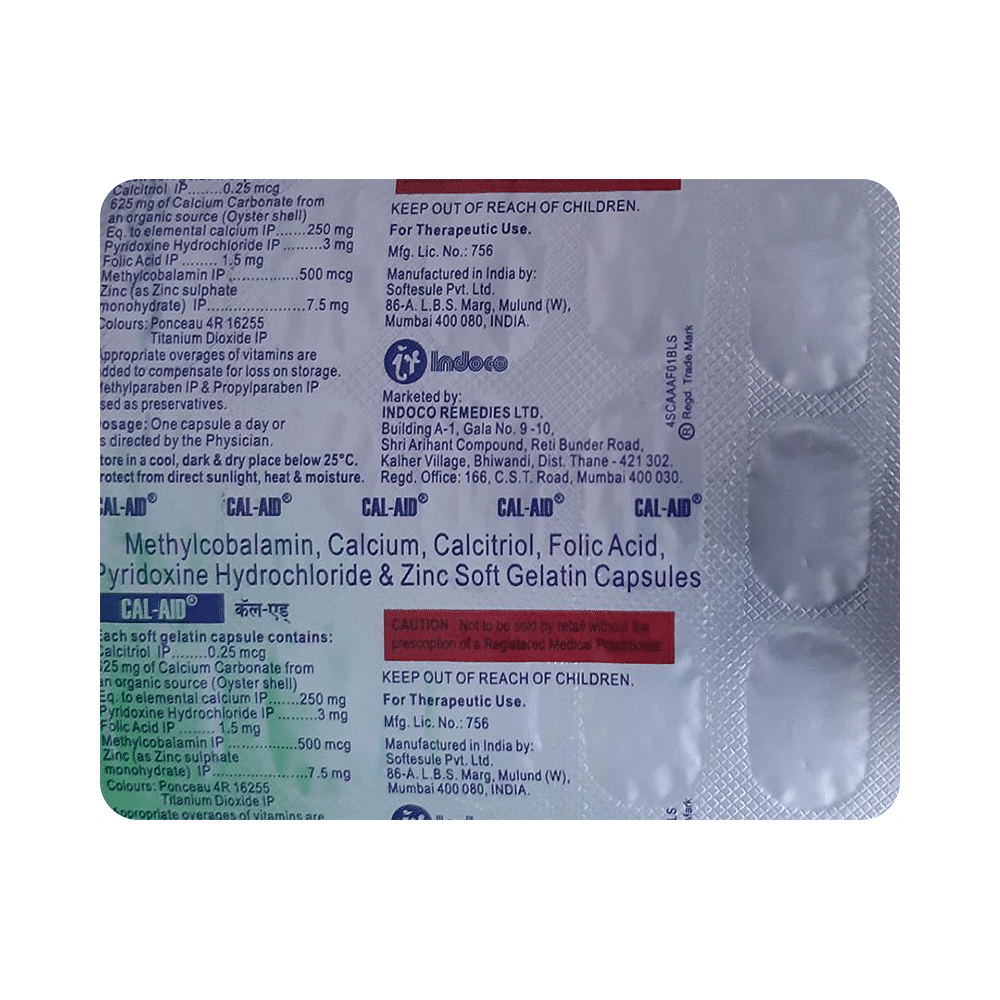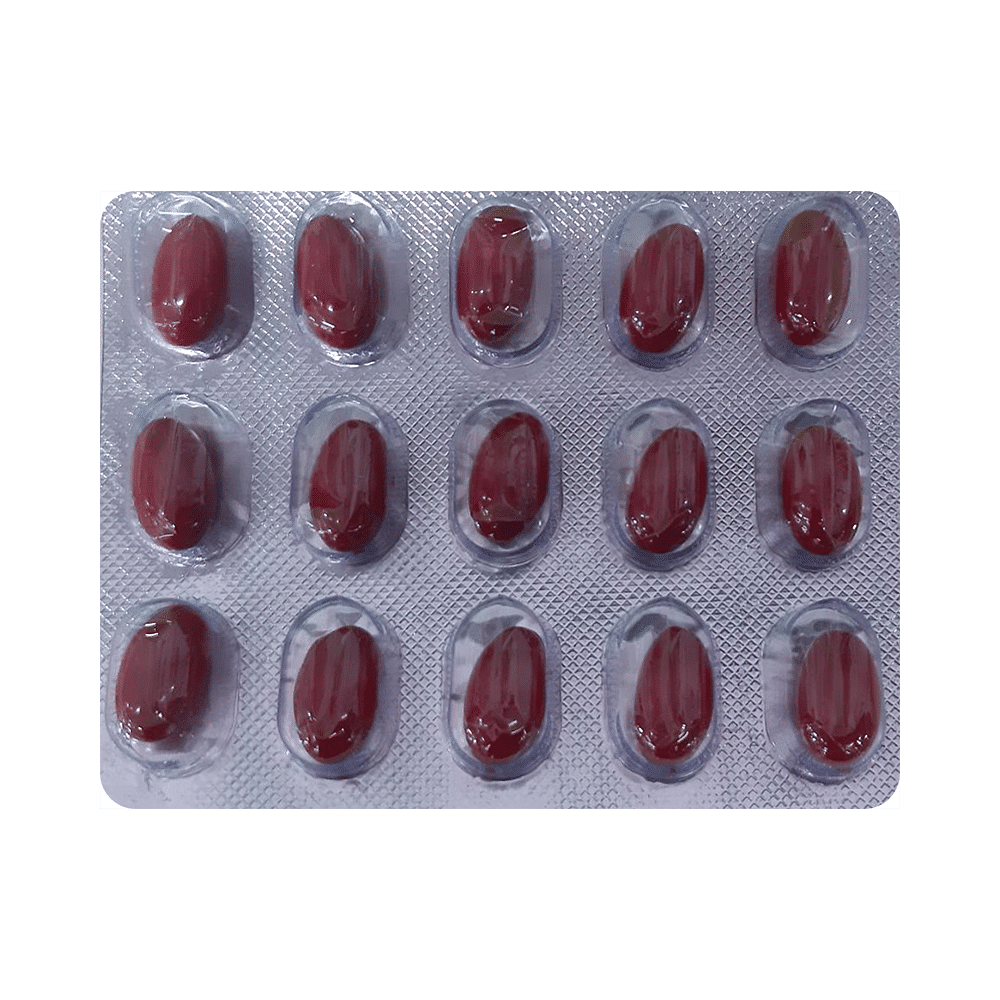



Cal-Aid Soft Gelatin Capsule
Manufacturer
Indoco Remedies Ltd
Salt Composition
Calcitriol (0.25mcg) + Calcium (250mg) + Folic Acid (1.5mg) + Methylcobalamin (500mcg) + Vitamin B6 (Pyridoxine) (3mg) + Zinc (7.5mg)
Key Information
Short Description
Cal-Aid Soft Gelatin Capsule is a combination of vitamins and mineral supplements prescribed to treat vitamin and other nutritional deficiencies.
Dosage Form
Soft Gelatin Capsule
Introduction
Cal-Aid Soft Gelatin Capsule may be taken with or without food. It should be used in the dose and duration prescribed by your doctor. It is advised to take this medicine at a fixed time to avoid missing a dose. Cal-Aid Soft Gelatin Capsule is usually a safe medicine with minimal or no side effects. However, if you experience severe diarrhea, vomiting, or constipation, consult your doctor without delay. Before taking this medicine, tell your doctor if you have any other health conditions. Inform them if you are taking any other medicines or are pregnant or breastfeeding. It is advised not to take alcohol after taking this medicine.
Directions for Use
Take this medicine in the dose and duration as advised by your doctor. Swallow it as a whole. Do not chew, crush or break it. Cal-Aid Soft Gelatin Capsule may be taken with or without food, but it is better to take it at a fixed time.
Safety Information
Side Effects
No common side effects listed.
Alcohol Warning
It is not known whether it is safe to consume alcohol with Cal-Aid Soft Gelatin Capsule. Please consult your doctor.
Breastfeeding Warning
Information regarding the use of Cal-Aid Soft Gelatin Capsule during breastfeeding is not available. Please consult your doctor.
Pregnancy Warning
Information regarding the use of Cal-Aid Soft Gelatin Capsule during pregnancy is not available. Please consult your doctor.
Interacting Medicines
Orlistat
How it works
Cal-Aid Soft Gelatin Capsule is a combination of vitamin B and minerals. Calcitriol works by helping the body utilize more of the calcium present in ingested foods or supplements and regulating the body's production of parathyroid hormone. Calcium prevents or treats negative calcium balance seen in low serum calcium conditions. Calcium is required for healthy muscles, bones, the nervous system, and the heart. Folic acid is essential for the production of red blood cells. It prevents and treats folate deficiency and anemia. When taken by pregnant women, folic acid prevents miscarriage, preterm labor, and neural tube defects in infants. Methylcobalamin corrects vitamin B12 deficiency, thereby helping in treating certain anemias and nerve problems. Pyridoxine treats or prevents the deficiency of vitamin B6 and improves the functioning of the nervous and immune systems. Zinc improves the immune system and helps form red blood cells.
Quick Tips
Avoid taking antacids 2 hours before or after taking Cal-Aid Soft Gelatin Capsule Drink plenty of water while taking this medicine Along with taking Cal-Aid Soft Gelatin Capsule, take a healthy diet, sleep for a minimum of 6-7 hours at night, and reduce stress levels Let your doctor know if you are taking any other medications like antihypertensives, antibiotics, or medicines for heart disease or bone disorders
Frequently asked questions
How does Cal-Aid Soft Gelatin Capsule help?
Cal-Aid Soft Gelatin Capsules are nutritional supplements that contain various vitamins and minerals. These supplements help replenish essential nutrients in your body when you lack them from food sources. The capsules also contain a high amount of calcium, which can improve your calcium levels.
What should you avoid while taking Cal-Aid Soft Gelatin Capsule?
It is advisable to avoid taking this medicine with other herbal or health supplements.
Why do you need calcium?
Calcium plays a crucial role in maintaining strong bones and teeth. It also facilitates nerve signal transmission, helps blood clotting, and aids in muscle contraction and relaxation. Since most of the calcium you obtain from your diet is stored in your bones and teeth, a lack of this mineral can impair your bone health and increase the risk of osteoporosis. This is why you must meet your daily calcium needs to maintain healthy bones and overall well-being.
How much calcium do I need?
The recommended dietary allowance (RDA) for calcium in adults according to the Indian Council of Medical Research (ICMR) guidelines is 600 mg. Pregnant and lactating women require 1200 mg. Consult your doctor if you have any questions about calcium intake.
How can I check my calcium level?
You can book a calcium test at an accredited laboratory. This will allow you to measure the amount of calcium in your blood. After receiving your test report, consult with your doctor to evaluate the results.
Can excess calcium be harmful?
Taking calcium supplements and consuming calcium-rich/fortified foods can potentially lead to you getting more calcium than you need. Excess calcium may cause bloating, constipation, a chalky taste in your mouth, and an increased risk of kidney stones, prostate cancer, and heart disease.
What to do if I have low calcium levels?
If your calcium blood test results indicate low levels, your doctor may advise you to increase your intake of calcium-rich foods. Dairy products such as milk, yogurt, and cheese, oranges, and fortified foods like breakfast cereals, soymilk, and bread are good sources of calcium. In cases of severe calcium deficiency, a doctor might prescribe calcium supplements. Always remember to take calcium supplements only as per your doctor's instructions.
When is the best time to take Cal-Aid Soft Gelatin Capsule?
It's generally recommended to take multivitamins in the morning after breakfast for optimal nutrient absorption.


